

Learning Theories: Understanding the 4 Major Ones for the Classroom - Leader In Me. What are the four major learning theories, what is the role they play in education today, and how does it all connect with Leader in Me?
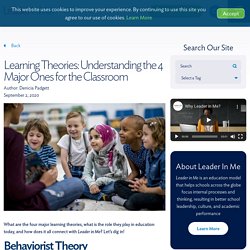
HIGH-QUALITY TEACHING FOR PUPILS WITH SEND Teachers should develop a repertoire of strategies they can use flexibly in response to individual needs and use them as the starting point for classroom teaching for all pupils, including those with SEND. Unit of Inquiry Planning Process and Resources (open) AU ClickView EduVIC HITS A1 poster PRINT. Primary School Video Teaching Resources Online. Literacy Masterclass 2: Evidence-Based High Impact Strategies. Effective Teaching Strategies EDFX521 Group 2 Carolyn - Google Docs. Effective Teaching Strategies EDFX521 Group 2 Carolyn - Google Docs.
Curriculum kit healthy choices. Teaching resources - Healthy Kids. Healthy Kids Association developed resources Crunch&Sip curriculum materials – a comprehensive resource that covers food groups, everyday vs sometimes foods, the importance of water, and fruit and vegetables.
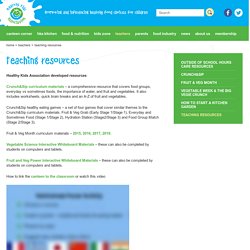
It also includes worksheets, quick brain breaks and an A-Z of fruit and vegetables. Crunch&Sip healthy eating games – a set of four games that cover similar themes to the Crunch&Sip curriculum materials. Parent information. Pages - Curriculum area resources. We help great education practice become common practice. What is it?
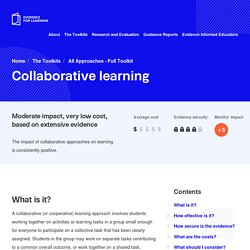
A collaborative (or cooperative) learning approach involves students working together on activities or learning tasks in a group small enough for everyone to participate on a collective task that has been clearly assigned. Students in the group may work on separate tasks contributing to a common overall outcome, or work together on a shared task. Some collaborative learning approaches put mixed ability teams or groups to work in competition with each other in order to drive more effective collaboration. There is a very wide range of approaches to collaborative and cooperative learning involving different kinds of organisation and tasks.
Peer tutoring can also be considered as a type of collaborative learning, but in the Toolkit it is reviewed as a separate topic. Planning a lesson. Mini Documentary. 21st century education. Dispositions: What the heck are they, and how do we teach them? Educators from all sides of the spectrum seem to agree that it isn’t sufficient for us to support students to just develop academic knowledge, we also need to support them to develop characteristics that will help them to have, ‘Healthy relationships to themselves, to other people, and to learning so that they can navigate their lives in ways that are empowering and satisfying to them.’ – Kate McAllister) This idea is captured well by Guy Claxton’s idea of the learning river.
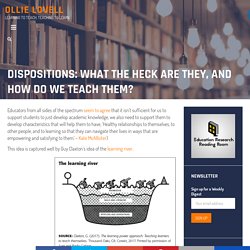
The learning river is a powerful metaphor that describes three different layers of learning that simultaneously occur in the vast majority of classrooms (whether we, as teachers, have designed it or not!). On the surface, and most readily observable, we teach knowledge. Deeper down we teach skills and literacies that support that knowledge. And flowing along the bottom, often imperceptibly, is the formation of attitudes and dispositions. And herein lies the challenge. Factor magazine. Planning a lesson. The Future Of Work Will Demand These 8 New Skills. The future of work is upon us and while we’ve been entrenched at home, the world has changed significantly.
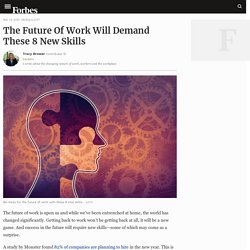
Getting back to work won’t be getting back at all, it will be a new game. Seeing Learning Through the Eyes of the Students w/John Hattie. Podcast Special: Dylan Wiliam On Effective Questioning In The Classroom by Teacher Magazine (ACER) UDL: The UDL Guidelines. 8 Quick Formative Assessment Strategies to Check for Understanding. Using formative assessments designed to check for understanding and provide students with feedback and support is one of the most effective ways to improve and enhance student learning.
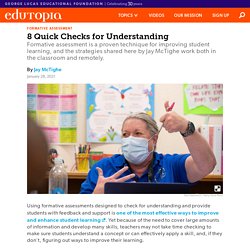
Yet because of the need to cover large amounts of information and develop many skills, teachers may not take time checking to make sure students understand a concept or can effectively apply a skill, and, if they don’t, figuring out ways to improve their learning. Thankfully, there are practical, proven formative assessment techniques that teachers can use as a quick “pulse check” to gauge students’ understanding. Evidence and research. Parent information. Web Resources for Learning - Thinking Routines. PZ Thinking Routines from Sue Borchardt on Vimeo.
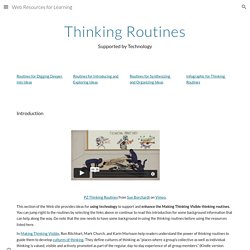
This section of the Web site provides ideas for using technology to support and enhance the Making Thinking Visible thinking routines. - Login. Differentiation Central. Videos An Introduction to DI Common Misconceptions About DI The Journey to Differentiation Providing Quality Curriculum Building Community Instructional Strategies Continuous Assessment Classroom Routines & Management.
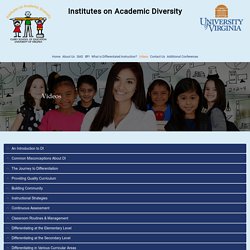
Youtube. Using Education Data: What Works, What Doesn't. Why Students Should Write in All Subjects. For Kyle Pahigian, a 10th-grade math teacher at University Park Campus School in Massachusetts, a lesson on congruent triangles doesn’t start with calculators and protractors.

Instead, she hands her students a treasure map and asks them to write detailed directions—using landmarks as a guide—to the buried treasure. “I won’t tell the kids right away, ‘Today we’re going to learn about triangle congruence theorems,’” said Pahigian. “I want them to instead view it as them experimenting with something and doing something that they feel like they’re really good at.” Students often feel intimidated by math, and transforming the activity into a writing exercise eases some of the anxiety of introducing difficult concepts, she said. In Pahigian’s math class, writing is regularly used as a learning strategy, one that gives her a window into her students’ thinking. Twitter 101 for Teachers - The Basics on Getting Started. Posted by Erin Whalen Are you an educator who strives to be better each day?
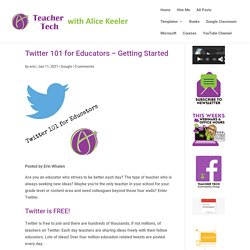
The type of teacher who is always seeking new ideas? Maybe you’re the only teacher in your school for your grade level or content area and need colleagues beyond those four walls? Enter Twitter. ACU - Interim Individual Report for SELT - EDFX343 ED.ST&PE 3: LEARN'NG ENVIRON - Semester 2, 2020 Melbourne (202060_7132) Carolyn Walsh. Latest resources and recommendations from Kath Murdoch. By now some of you will already be on a well-deserved break - perhaps your winter Christmas break or the beginning of the longer summer break in my part of the world. I had hoped to get this final newsletter out ahead of the break but it was not to be! Before I begin my usual round of resources and recommendations, I want to take this opportunity to say a HUGE THANK YOU to everyone that has supported my work during this crazy year.
When the pandemic hit, I (like so many others) lost almost all my work overnight. The 10 Most Significant Education Studies of 2020. Calling 2020 a turbulent year would be an understatement. As the pandemic disrupted life across the entire globe, teachers scrambled to transform their physical classrooms into virtual—or even hybrid—ones, and researchers slowly began to collect insights into what works, and what doesn’t, in online learning environments around the world.
Meanwhile, neuroscientists made a convincing case for keeping handwriting in schools, and after the closure of several coal-fired power plants in Chicago, researchers reported a drop in pediatric emergency room visits and fewer absences in schools, reminding us that questions of educational equity do not begin and end at the schoolhouse door. Primary Matters, issue 23: The review of the Australian Curriculum and Digital Technologies in focus (DTiF) The Digital Technologies Hub The Digital Technologies Hub is a fantastic resource to help teachers, students and families engage with, and learning more about, digital technologies. Access the Digital Technologies Hub for more information. The Australian Computing Academy The Australian Computing Academy (ACA) has many teacher resources available, including webinar recordings, teaching materials and assessment ideas. Visit the academy’s website to access the resources.
Digital Technologies National Lending Library. Professional learning. Primary Matters, issue 23: The review of the Australian Curriculum and Digital Technologies in focus (DTiF) Primary Matters, issue 23: The review of the Australian Curriculum and Digital Technologies in focus (DTiF) Curriculum review. Review of the Australian Curriculum On 12 June 2020, education ministers agreed that it was timely to review the Foundation – Year 10 Australian Curriculum, which has been in place since 2015.
In preparation for the review, ACARA consulted widely with key education stakeholders and groups to define the approach and scope of the review. This work informed the review's Terms of reference (PDF 94 kb). Our program of research has benchmarked the Australian Curriculum against the curricula of Singapore, Finland, British Columbia and New Zealand, and we sought feedback from state and territory jurisdictions through our annual monitoring process. 6 Exercises to Get to Know Your Students Better—and Increase Their Engagement.
Hindered by video screens, fluctuating schedules, and health regulations, teachers are up against the odds this school year when it comes to getting to know their students. “It’s hard to really get to know your students through a webcam," @mark_bevacqua wrote on Twitter, while @cheri_cheralex shared her struggles of seeing students in masks or “with eyes only.” While get-to-know-you activities are typically earmarked for the first weeks of school, they shouldn’t end there, say educators and researchers. Latest newsletter: musings and resources from Kath Murdoch.
The sun is shining on a glorious day here in Melbourne. I hope that, wherever you are in the world, you are managing to find some sun – be it real or metaphorical. Pdf attachment 557155. Kath murdoch inquiry cycle compared to 5 e edu. Design a Choose Your Own Adventure Learning Experience. Clarity: a professional learning resource. Teaching materials and methods. Literacy Teaching Toolkit.
Callow, J. (2013). QCAA OER Database. Lee says… Youtube. Curriculum connections. Latest news and resource recommendations from Kath Murdoch. Learning Skills – MISA London. Chapters International. What will you keep from your blended learning experience? 09 June 2020. Ver Concept Based Inquiry with Kath Murdoch and Tania Lattanzio en línea. 20191211 Alice Springs (Mparntwe) Education Declaration ACCESSIBLE.
Victorian Curriculum Planning.